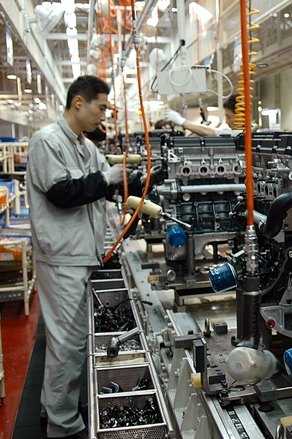Foreign Car Makers Start A Building Boom In China

While all eyes are on the Beijing Auto Show, which starts by the end of this week, manufacturers are looking at plots of land and architect plans for new plants. According to The Nikkei [sub], carmakers are adding capacity to keep up with the ravenous appetite of the world’s largest car market.
Foreign carmakers don’t seem to be in a mood to exit, or to be squeezed out of this market anytime soon. According to the Nikkei, their building plans are “in response to the growing prominence of Chinese automakers.”
Volkswagen will build two plants in Southern China, where Volkswagen’s presence is thin at the moment. To keep matter balanced with their joint venture partners, one plant will be built with FAW, the other with SAIC. Both plants will add an annual output capacity of at least 200,000 units. The Volkswagen brand currently leads the Chinese passenger vehicle market. In the first three months, VW and its two Chinese joint ventures, FAW-Volkswagen and Shanghai-Volkswagen, sold 457,259 vehicles in China, up 61 percent. The Chinese market grew 76.3 percent in the first quarter. According to the Nikkei, Volkswagen’s “share has begun to slip as demand outstrips production, forcing it to expand output to stop the decline.”
GM China also has big expansion plans. They will launch 25 models this year and next. They target sales of 3m units in 2015, up more than 60 percent from 2009. Remember when I reported that car executives predict an average sales growth of 20 percent per annum between now and 2015 in China? Those who questioned my sanity should ask GM first. As a majority shareholder, you deserve an answer
Japanese carmakers, “are wary about further capital spending,” says the Nikkei. But they want to understand and develop better for the Chinese market.
Toyota is in final talks with authorities to build a wholly owned development facility in Jiangsu Province.
Nissan plans to open a design center in Beijing early next year.
Japanese car makers, especially Toyota, are lagging in the Chinese market. Toyota gained a paltry 39 percent in Q1. Sumimasen, that’s hemorrhaging market share. Admonishes the Nikkei: “Japanese automakers must go beyond lifting local production and increasing the proportion of Chinese-made parts. They are now at a stage where they need to further localize their products by other means.”

Bertel Schmitt comes back to journalism after taking a 35 year break in advertising and marketing. He ran and owned advertising agencies in Duesseldorf, Germany, and New York City. Volkswagen A.G. was Bertel's most important corporate account. Schmitt's advertising and marketing career touched many corners of the industry with a special focus on automotive products and services. Since 2004, he lives in Japan and China with his wife <a href="http://www.tomokoandbertel.com"> Tomoko </a>. Bertel Schmitt is a founding board member of the <a href="http://www.offshoresuperseries.com"> Offshore Super Series </a>, an American offshore powerboat racing organization. He is co-owner of the racing team Typhoon.
More by Bertel Schmitt
Latest Car Reviews
Read moreLatest Product Reviews
Read moreRecent Comments
- Doug brockman There will be many many people living in apartments without dedicated charging facilities in future who will need personal vehicles to get to work and school and for whom mass transit will be an annoying inconvenience
- Jeff Self driving cars are not ready for prime time.
- Lichtronamo Watch as the non-us based automakers shift more production to Mexico in the future.
- 28-Cars-Later " Electrek recently dug around in Tesla’s online parts catalog and found that the windshield costs a whopping $1,900 to replace.To be fair, that’s around what a Mercedes S-Class or Rivian windshield costs, but the Tesla’s glass is unique because of its shape. It’s also worth noting that most insurance plans have glass replacement options that can make the repair a low- or zero-cost issue. "Now I understand why my insurance is so high despite no claims for years and about 7,500 annual miles between three cars.
- AMcA My theory is that that when the Big 3 gave away the store to the UAW in the last contract, there was a side deal in which the UAW promised to go after the non-organized transplant plants. Even the UAW understands that if the wage differential gets too high it's gonna kill the golden goose.


































Comments
Join the conversation
When I worked for a German company starting up in America, they flew me over and after long hours of drinking with my new German masters, in Germany, I decided it was time to bring up the holocaust and the response was "yes we did that, by the way on a map of america can you show me where all the indians live? What happened to them?" I just smiled. All nations and peoples are capable and have done what the Germans and Japanese did in recent history. Is there a generation that would never buy japanese in China? Sure, just as there once was in the US, they are dead or dying now.
1) I don't think Japanese brands suffer because of the war. After all, those who hate the Japanese are mostly immature or poor people who can't afford a car anyway. 2) However, that is not to say Japanese brands didn't suffer. Mostly due to racism. Even though they don't admit it, most Chinese regard Caucasians as being superior to Asians. Just look at Hyundai. If the war is a main contributing factor, you would think that would benefit the Korean brand (because Korea was an ally), right? Wrong, Hyundai suffers even more than the Japanese. It's the kind of mentality that you prefer total strangers (Germany) to win a lottery, than your coworkers (Japan/Korea) to win it.